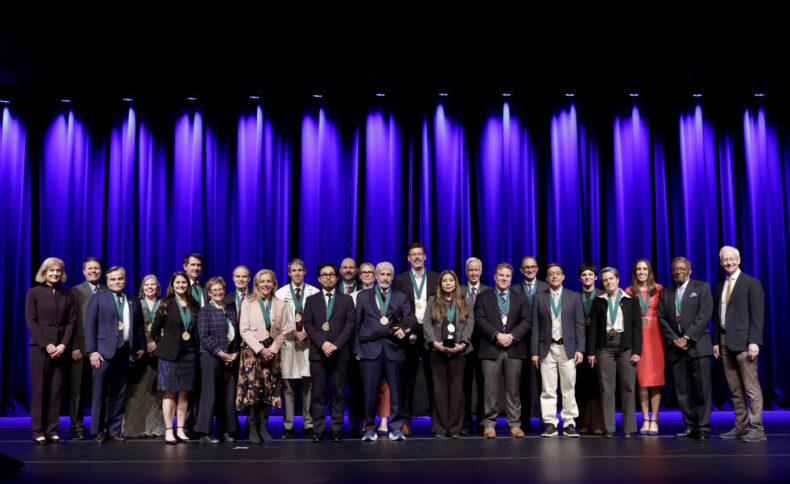
Keith Obstein, MD, MPH, professor of Medicine at Vanderbilt University Medical Center and professor of Mechanical Engineering at Vanderbilt University, has received the inaugural Innovator of the Year Award from the Brock Family Center for Applied Innovation in recognition of his achievements in developing and commercializing a magnetic, flexible colonoscopy system with the potential to provide a safer alternative to standard colonoscopy.
“We are thrilled to recognize Dr. Obstein’s achievements as he and his team moved this technology from concept to commercialization,” said Jennifer Pietenpol, PhD, holder of the Brock Family Directorship in Career Development. Pietenpol is also Chief Scientific and Strategy Officer and Executive Vice President for Research at VUMC. “His journey from creating a device, to conducting an initial human study of potentially revolutionary technology to forming a company so this work might one day benefit individuals worldwide is inspiring. He has certainly set a high bar for this award going forward.”
A novel endoscope developed by the team contains a video camera, a permanent magnet at the end of a tether and an external permanent magnet attached to a robotic arm. The endoscope is guided through the colon by the magnetic coupling of the magnets.
The magnetic field generated, along with a localization algorithm, allows the system to know the exact position and orientation of the endoscope inside the body. An autonomous control algorithm allows the clinician to focus on finding and treating lesions while the system performs movements requested by the clinician.
“Supporting startup company formation is an integral part of the Brock Family Center’s mission,” said Kenneth Holroyd, MD, MBA, lead of the Brock Family Center for Applied Innovation, Vice President for Technology Transfer at VUMC and medical director of Vanderbilt University’s Center for Technology Transfer and Commercialization. “Dr. Obstein and his team worked tirelessly through a stepwise proof of concept, building a solid foundation of scientific evidence, so that they could move the technology to the marketplace. The formation of the biomedical tech company, Atlas Endoscopy, exemplifies an entrepreneurial spirit and determination that made Dr. Obstein a clear choice for this award.”
The development of the technology began as a collaboration between Obstein and Pietro Valdastri, PhD, professor and chair in Robotics and Autonomous Systems at the University of Leeds. Obstein and Valdastri run the Science and Technology of Robotics in Medicine (STORM) Lab USA and UK, respectively. Valdastri was a Vanderbilt University Mechanical Engineering faculty member until 2016 when he was hired by the University of Leeds.
During a presentation about the team’s work, Obstein called the process a true collaboration, crediting many, including his mentors, colleagues and the “41 students who have all put in blood, sweat and tears as part of this ride.”
Endoscopes used for colonoscopies have changed little since the 1960s. They require training to operate successfully; commonly employ sedation or anesthesia; can be painful for patients; and carry some risk due to the pushing force on the colon. Obstein and Valdastri set out to find a way to use a robotic platform to make the procedures painless, safer and easier to perform.
Along the way, they experienced a few grant rejections; pivoted to secure new funding; conducted in vivo porcine research; collaborated across 4,000 miles before the pandemic made videoconferencing normal; fine-tuned their technology; published papers; navigated regulatory compliance; and ultimately founded Atlas Endoscopy.
“If you believe in something, if you think it’s a good idea, take initiative and see what you can do with it,” Obstein encouraged the audience. “Use ingenuity. Everyone has different strengths. Rely on those strengths, and get it done. And luck. There’s a lot of luck in this, from grants, to people, to meeting deadlines. And be sure to capitalize on opportunities. This was a great opportunity for us to really push the envelope in the field.”
Obstein is a fellow of the American Society for Gastrointestinal Endoscopy, the American College of Gastroenterology and the American Gastroenterological Association. He is board certified in gastroenterology.
His research has been supported by the Department of Defense supported Center for Integration of Medicine and Innovative Technology, the Vanderbilt Institute for Surgery and Engineering, the Vanderbilt University Discovery Grant Program, the Broad Medical Research Program, the National Science Foundation, the Higher Education Funding Council for England, Cancer Research UK, and the National Institutes of Health.
The Brock Family Center for Applied Innovation at VUMC was established in May 2022 with a $10 million gift from the Brock family, including John F. Brock III, his wife, Mary, and their three adult children, Rebecca Brock Dixon, John F. Brock IV and Major Brock.
The Brock family has supported Vanderbilt-Ingram Cancer Center and VUMC for many years through philanthropy and advocacy. Their many gifts have supported fellowships, cancer research, mentorship and career development for scientists. The family has a special interest in cancer research: John Brock III’s mother, Anise McDaniel Brock, died of lung and colon cancer in 2006.
The Brock Family Center for Applied Innovation engages, catalyzes and enables a glide path for faculty and external startup companies, with support for evaluating commercial potential and forming impactful businesses related broadly to medical care and health. More information can be found at: www.vumc.org/BrockCenter.










